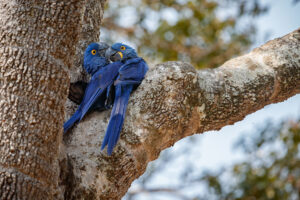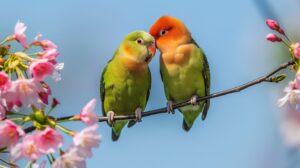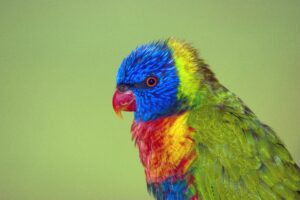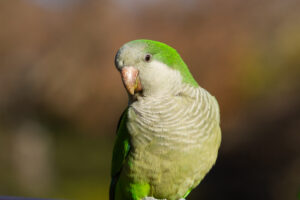Introduction
The African Grey parrot is renowned for its exceptional intelligence, remarkable speaking abilities, and long lifespan. When properly cared for, the African Grey parrot life expectancy can range from 40 to 60+ years in captivity, making them lifelong companions for dedicated owners. However, many African Grey parrots don’t reach their full lifespan potential due to preventable mistakes in their care.
As one of the most intelligent bird species on the planet, African Greys require specialized attention and knowledge to ensure they live their longest, healthiest lives. Understanding the African Grey parrot lifespan and factors that influence it is essential for anyone considering these magnificent birds as pets or for current owners wanting to provide optimal care.
In this comprehensive guide, we’ll explore how long do African Grey parrots live, the significant differences between the African Grey life expectancy in captivity versus the wild, and most importantly, the five deadly mistakes that can dramatically shorten your parrot’s life. By avoiding these common pitfalls, you can help ensure your feathered friend enjoys their full potential African Grey parrot age of several decades.

Understanding African Grey Parrot Lifespan
Before diving into the critical mistakes that affect longevity, let’s establish what we know about the natural lifespan of Congo African Grey parrot and their Timneh cousins.
How Long Do African Grey Parrots Live?
The average age of African Grey parrot in proper captive conditions can be quite impressive:
- Congo African Grey parrots (Psittacus erithacus) typically live 45-50 years with excellent care
- Timneh African Grey lifespan (Psittacus timneh) averages 40-50 years
- The oldest African Grey parrot on record reportedly lived to 72+ years
In contrast, the life expectancy of African Grey parrot in the wild is generally shorter, averaging 20-30 years. This difference highlights how proper husbandry in captivity can actually extend an African Grey’s natural lifespan.
The substantial gap between the potential African Grey lifespan: pet vs wild underscores both the responsibility and opportunity pet owners have. With proper care, your African Grey can live significantly longer than their wild counterparts, but with poor care, they may not even reach the African Grey bird lifespan they would achieve naturally.
Factors Affecting African Grey Parrot Longevity
Multiple factors contribute to African Grey parrot longevity, including:
- Genetics: Some parrots simply have genetic predispositions for longer or shorter lives
- Diet: Nutrition is perhaps the single most significant factor affecting lifespan
- Environment: Safety, stimulation, and stress levels dramatically impact health
- Healthcare: Regular veterinary care can prevent or catch issues early
- Social interaction: As highly social creatures, mental and emotional wellbeing affects physical health
Understanding these factors is the first step in learning how to increase African Grey lifespan beyond the average. Now, let’s explore the five deadly mistakes that can cut your parrot’s life expectancy significantly short.
5 Deadly Mistakes That Shorten African Grey Parrot Life Expectancy
Mistake #1: Inadequate Nutrition
Perhaps the most common and devastating mistake affecting African Grey parrot life expectancy is poor nutrition. Many owners inadvertently shorten their bird’s life by failing to provide a proper, balanced diet.
The Seed-Only Diet Trap
Many new owners feed their African Greys primarily seed-based diets, unaware this is equivalent to feeding a child nothing but fast food. Seeds are high in fat, low in vital nutrients, and can lead to:
- Obesity
- Fatty liver disease
- Vitamin A deficiency (particularly dangerous for African Greys)
- Calcium deficiency leading to seizures and bone problems
How this affects lifespan: An African Grey fed primarily seeds may live only 15-20 years instead of reaching their potential African Grey parrot age of 50+ years.
The Proper Diet for Maximum Longevity
To support maximum African Grey parrot life expectancy, their diet should include:
- High-quality pelleted food (50-60% of diet)
- Fresh vegetables and fruits (30-40% of diet)
- Limited healthy nuts and seeds (10% of diet)
- Occasional healthy proteins
According to avian veterinarians, proper nutrition alone can add 10+ years to your African Grey parrot lifespan.
Dr. Brian Speer, a renowned avian veterinarian, states: “Nutrition is the foundation of health in African Greys. The difference between a well-fed and poorly-fed parrot can be decades of life.”
For more detailed information on optimal African Grey nutrition, check out our complete guide to parrot nutrition.µ
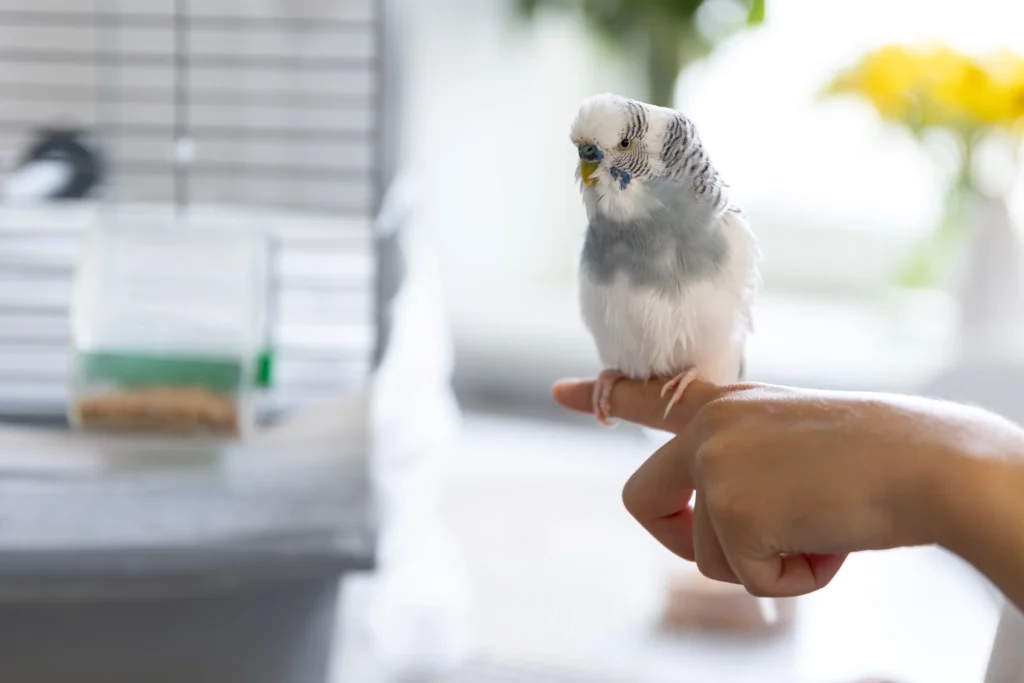
Mistake #2: Toxic Exposure in the Home
Many owners are unaware their homes contain numerous hazards that can dramatically reduce how long can an African Grey live. African Greys are particularly sensitive to toxins due to their efficient respiratory systems and curious nature.
Common Household Toxins
The following common items can be deadly to African Greys:
- Non-stick cookware (Teflon) when overheated
- Scented candles, air fresheners, and essential oils
- Household cleaners and aerosols
- Cigarette smoke
- Lead from old paint or certain toys
- Avocado, chocolate, caffeine, and alcohol
- Certain houseplants (philodendron, peace lily, etc.)
How this affects lifespan: Acute toxic exposure can cause immediate death, while chronic low-level exposure can reduce African Grey parrot life expectancy by causing organ damage over time.
Creating a Safe Environment
To maximize your parrot’s lifespan:
- Switch to bird-safe cookware and cleaning products
- Eliminate smoking in the home
- Research all plants and foods before introducing them
- Consider air purifiers for your home
Dr. Susan Orosz, avian medicine specialist, notes: “Many African Greys die prematurely from preventable toxic exposures. Bird-proofing your home is essential for ensuring your parrot reaches its full life potential.”
Mistake #3: Inadequate Veterinary Care
Many owners underestimate the importance of specialized avian veterinary care in extending African Grey parrot life expectancy. Birds naturally hide illness as a survival mechanism, meaning by the time symptoms are obvious, disease is often advanced.
Critical Veterinary Care Mistakes
Common errors include:
- Waiting for obvious symptoms before seeking medical attention
- Using general veterinarians without avian specialty training
- Skipping annual wellness exams
- Missing early disease indicators
- Failing to perform recommended diagnostic tests
How this affects lifespan: Regular preventative veterinary care can add 5-10 years to your African Grey parrot lifespan by catching issues early when they’re more treatable.
Proper Veterinary Protocol
For maximum longevity:
- Establish a relationship with an avian-certified veterinarian
- Schedule wellness exams every 6-12 months
- Perform baseline blood work annually after age 10
- Learn to recognize subtle signs of illness
- Follow through with all recommended treatments
Research published in the Journal of Avian Medicine and Surgery indicates that African Greys receiving regular preventative care lived an average of 7.4 years longer than those receiving emergency-only care.
Learn more about recognizing illness signs in our guide to parrot health monitoring.
Mistake #4: Psychological Neglect and Social Isolation
Perhaps the most overlooked factor affecting African Grey parrot life expectancy is psychological wellbeing. African Greys are among the most emotionally complex birds, with intelligence comparable to a 3-5 year old child. Psychological neglect creates chronic stress that directly impacts physical health and longevity.
Social and Mental Stimulation Failures
Deadly mistakes include:
- Housing birds alone without adequate human interaction
- Failing to provide mental stimulation and enrichment
- Ignoring the need for consistent daily interaction
- Keeping birds in areas isolated from family activity
- Unpredictable handling or interaction schedules
How this affects lifespan: Studies show that socially integrated African Greys with appropriate mental stimulation typically live 10+ years longer than isolated or under-stimulated birds.
Proper Psychological Care
To support optimal African Grey parrot longevity:
- Provide at least 2-4 hours of direct interaction daily
- Create a rotation of mentally stimulating toys and puzzles
- Position the cage in a family area (while maintaining a safe environment)
- Establish consistent daily routines
- Consider a second bird for companionship if you have limited time
Dr. Irene Pepperberg, famous for her work with Alex the African Grey, notes: “African Greys are social creatures with complex emotional needs. Meeting these needs doesn’t just improve quality of life—it directly extends lifespan by reducing chronic stress hormones that suppress immune function.”
Mistake #5: Improper Housing and Environmental Conditions
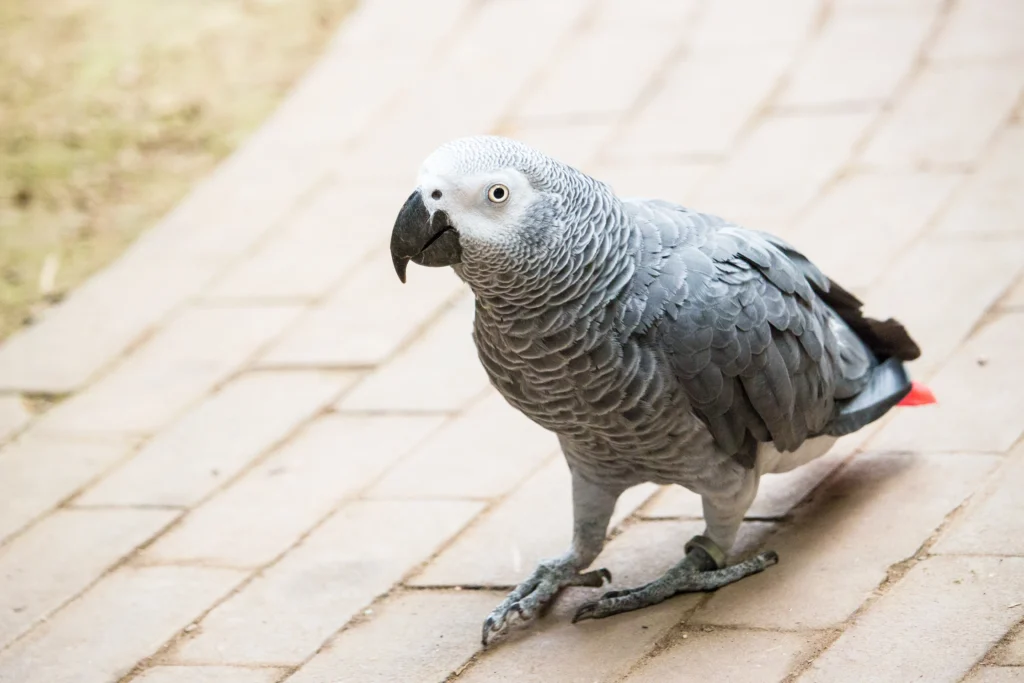
The final deadly mistake affecting African Grey life expectancy in captivity relates to their physical environment. Many owners unintentionally create living conditions that lead to chronic stress, injury risk, or disease exposure.
Housing and Environment Errors
Common mistakes include:
- Cages that are too small (restricting movement)
- Poor cage placement (drafty areas, kitchens with fume exposure)
- Inappropriate perches causing foot problems
- Insufficient opportunities for exercise and flight
- Exposure to temperature extremes
- Poor air quality
- Inconsistent light/dark cycles disrupting sleep
How this affects lifespan: Proper housing and environmental conditions can add 5-10 years to your African Grey parrot life expectancy by reducing stress, preventing injuries, and supporting natural behaviors.
Creating the Optimal Environment
For maximum lifespan:
- Provide the largest cage possible (minimum 36″W × 24″D × 48″H for a single bird)
- Include various perch types of different diameters
- Ensure daily out-of-cage time in a safe area
- Maintain consistent temperature (65-80°F)
- Provide 10-12 hours of darkness for proper sleep
- Use full-spectrum lighting if natural sunlight is limited
- Keep humidity between 40-60%
Research published in Applied Animal Behaviour Science found that African Greys housed in enriched environments with appropriate space lived an average of 8.3 years longer than those in minimum standard housing.
Understanding the African Grey Parrot Life Cycle
To properly care for African Greys throughout their long lives, it’s helpful to understand the basic stages of the African Grey parrot life cycle and how care requirements change with age.
Baby (0-1 year)
During this critical developmental period:
- Proper nutrition is essential for immune system development
- Early socialization establishes behavioral patterns
- Growth rate is rapid
- Learning capacity is at its peak
Young Adult (1-5 years)
This period establishes patterns for adult life:
- Hormonal changes begin
- Behavioral boundaries are tested
- Mental capabilities fully develop
- Nutritional requirements remain high
Adult (5-30 years)
The prime of an African Grey’s life:
- Behavior stabilizes
- Reproductive hormones may cause seasonal changes
- Mental abilities remain sharp
- Health issues are typically minimal with proper care
Senior (30+ years)
As your Grey ages:
- Metabolism slows, requiring dietary adjustments
- Arthritis may develop
- Vision and hearing may decline
- More frequent veterinary monitoring becomes necessary
Understanding these stages helps you adapt care to maximize African Grey parrot longevity throughout their life journey.
Wild vs. Captive: Understanding the Lifespan Difference
The significant difference between African Grey lifespan: pet vs wild merits deeper exploration. In their natural habitat, African Greys face numerous challenges that captive birds don’t:
- Predators
- Disease without medical intervention
- Food scarcity during certain seasons
- Habitat destruction
- Poaching
- Weather extremes
Life expectancy of African Grey parrot in the wild averages 20-30 years, significantly shorter than the potential 40-60 years in captivity. However, this comparison comes with important ethical considerations.
Wild African Greys live as they evolved to—in flocks, flying freely across miles of forest canopy, selecting from numerous food sources, and engaging in natural breeding behaviors. While their lives may be shorter, many would argue they’re living as nature intended.
Captive African Greys can enjoy longer lives when all their physical and psychological needs are met. However, this requires significant dedication from owners to ensure these intelligent birds don’t merely exist but truly thrive throughout their long lives.
Record-Breaking Longevity: The Oldest African Grey Parrots
Several well-documented cases demonstrate the extraordinary potential African Grey parrot life expectancy when provided exceptional care:
- Cookie: Verified to have lived 72 years in captivity
- Poncho: A Congo African Grey who reportedly reached 92 years (though this is not officially verified)
- Alex: Dr. Pepperberg’s famous research subject, who unfortunately died prematurely at 31 of arterial disease
These exceptional birds demonstrate the remarkable potential lifespan of well-cared-for African Greys.
How to Increase African Grey Lifespan: Advanced Strategies
Beyond avoiding the deadly mistakes, several proactive strategies can potentially extend your African Grey’s life beyond the average African Grey parrot age expectancy:
1. Implement Foraging Enrichment
In nature, African Greys spend 4-6 hours daily foraging for food. Captive birds with food readily available often develop behavioral issues from boredom.
To extend lifespan:
- Use foraging toys that require problem-solving to access food
- Hide food throughout the cage in different locations
- Rotate new foraging challenges weekly
Research shows that foraging enrichment reduces stress hormones that accelerate aging.
2. Create a Comprehensive Exercise Program
Regular exercise supports cardiovascular health, maintains healthy weight, and provides mental stimulation.
Effective strategies include:
- Daily flight time in a safe, enclosed area
- Training sessions that encourage movement
- Climbing opportunities
- Dancing and movement games
A study in the Journal of Exotic Pet Medicine found that African Greys with regular exercise programs had significantly lower incidence of fatty liver disease, a common cause of premature death.
3. Implement Immune-Supporting Nutrition
Beyond basic good nutrition, certain supplements may support immune function and longevity:
- Properly dosed probiotics designed for birds
- Monitored vitamin D3 supplementation (especially for birds without sun exposure)
- Appropriate omega fatty acid balance
- Antioxidant-rich foods like blueberries, pomegranate, and specialized pellets
Always consult an avian veterinarian before starting any supplement regimen.
4. Reduce Stress Through Environmental Management
Chronic stress accelerates aging in all species. For African Greys, stress management might include:
- Consistent daily routines
- Safe spaces for retreat when frightened
- Gradual introduction to new experiences
- Recognition and avoidance of individual stressors
Dr. Scott Echols, avian specialist, notes: “Managing stress might be the single most important factor in extending parrot lifespan after nutrition.”
5. Regular Training and Mental Stimulation
Like humans, African Greys with active minds tend to live longer. Implement:
- Regular training sessions using positive reinforcement
- Puzzles of increasing difficulty
- Language development activities
- Novel experiences and controlled challenges
Learn more about enrichment activities in our guide to parrot mental stimulation.
Signs Your African Grey Is Aging Healthily
How can you tell if your efforts to maximize African Grey parrot life expectancy are working? Here are positive indicators that your Grey is aging well:
- Maintains consistent weight within healthy range
- Demonstrates interest in food, toys, and interaction
- Feathers remain bright and in good condition
- Regular molting without excessive feather loss
- Alert and responsive to environment
- Maintains normal activity levels
- Good appetite and normal droppings
- Clear eyes and nares (nostrils)
- Smooth beak and appropriate length
Regular weighing (weekly or monthly) can help you track subtle changes that might indicate health issues before they become serious.
When to Consult a Veterinarian
To maximize African Grey parrot life expectancy, be vigilant for signs that require immediate veterinary attention:
- Weight loss of more than 10%
- Changes in droppings (color, consistency, frequency)
- Fluffed appearance for extended periods
- Discharge from eyes, nares, or mouth
- Breathing changes (tail bobbing, open-mouth breathing)
- Decreased appetite lasting more than 24 hours
- Changes in water consumption
- Unusual vocalization or silence
- Balance issues or weakness
- Behavioral changes
Remember that early intervention can add years to your African Grey parrot lifespan.
Conclusion
African Grey parrot life expectancy is remarkable among companion animals, with the potential for these intelligent birds to be lifelong companions for 40-60+ years when properly cared for. By avoiding the five deadly mistakes outlined in this article—poor nutrition, toxic exposure, inadequate veterinary care, psychological neglect, and improper housing—you can help ensure your African Grey lives its longest, healthiest life possible.
The commitment to caring for an African Grey is significant, spanning potentially half a century or more. However, the rewards of this relationship are equally substantial. These extraordinary birds offer unparalleled intelligence, emotional connection, and companionship that few other pets can match.
Whether you’re considering adding an African Grey to your family or seeking to improve care for your current bird, understanding and addressing these crucial factors will help your feathered friend achieve their maximum African Grey parrot longevity. By implementing the strategies outlined here, you’re not just adding years to your bird’s life—you’re adding life to your bird’s years.
For more information on optimizing parrot health and happiness, explore our other comprehensive guides at PetsPump.com.
Journal of Exotic Pet Medicine
Disclaimer: While this article provides general information about African Grey parrot care, it is not a substitute for professional veterinary advice. Always consult with an avian-certified veterinarian for health concerns regarding your specific bird.



